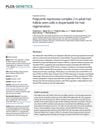 19 citations,
January 2018 in “BioMed Research International”
19 citations,
January 2018 in “BioMed Research International” miR-195-5p reduces hair growth ability in cells by blocking a specific growth signal.
 18 citations,
January 2017 in “Postępy Dermatologii i Alergologii”
18 citations,
January 2017 in “Postępy Dermatologii i Alergologii” EGFR inhibitors can cause various skin issues during cancer treatment, and managing these is important for patient care.
 16 citations,
June 2008 in “Springer eBooks”
16 citations,
June 2008 in “Springer eBooks” Over 50% of women over 50 experience hair loss, with minoxidil being the only proven effective treatment.
 13 citations,
January 2020 in “Experimental Dermatology”
13 citations,
January 2020 in “Experimental Dermatology” PRP growth factor concentrations vary, no significant hair growth difference found.
 12 citations,
June 2017 in “Cell Cycle”
12 citations,
June 2017 in “Cell Cycle” Minoxidil foam helps hair growth by increasing good proteins and decreasing bad pathways in men with hair loss.
 11 citations,
September 2013 in “Journal of the Egyptian Women's Dermatologic Society (Print)”
11 citations,
September 2013 in “Journal of the Egyptian Women's Dermatologic Society (Print)” Various treatments exist for hair loss, but more research is needed for better options.
 9 citations,
December 2020 in “Dermatologic Therapy”
9 citations,
December 2020 in “Dermatologic Therapy” Certain drugs are effective for skin conditions like psoriasis, vitiligo, and hair loss.
 9 citations,
August 2018 in “Biomedical dermatology”
9 citations,
August 2018 in “Biomedical dermatology” A peptide called DPS-1 helps human scalp cells grow and stimulates hair growth in mice.
 8 citations,
May 2019 in “Journal of dermatological treatment”
8 citations,
May 2019 in “Journal of dermatological treatment” Vismodegib is effective for basal cell carcinoma but has severe side effects.
 7 citations,
December 2020 in “Pharmaceutics”
7 citations,
December 2020 in “Pharmaceutics” A mix of tocopherol acetate and L-menthol helps grow hair better than using them separately or using minoxidil.
 6 citations,
December 2021 in “PLoS Genetics”
6 citations,
December 2021 in “PLoS Genetics” Polycomb Repressive Complex 2 is not needed for hair regeneration.
 4 citations,
February 2014 in “Proceedings of SPIE”
4 citations,
February 2014 in “Proceedings of SPIE” Low-Level Light Therapy is effective for skin rejuvenation, wound healing, and hair growth, with mild side effects.
 3 citations,
January 2019 in “Advances in stem cells and their niches”
3 citations,
January 2019 in “Advances in stem cells and their niches” Dermal papilla cells are key for hair growth and color, influencing hair type and size, and their interaction with stem cells could help treat hair loss and color disorders.
 1 citations,
February 2021 in “Cosmetics”
1 citations,
February 2021 in “Cosmetics” Fagraea berteroana fruit extract may promote hair growth by affecting cell proliferation and hair growth pathways.
 September 2016 in “Springer eBooks”
September 2016 in “Springer eBooks” Fat-derived stem cells may help treat skin aging and hair loss.
 January 2019 in “Springer eBooks”
January 2019 in “Springer eBooks” PRP and LLLT can improve hair growth in AGA, but more research needed.
5 citations,
March 2022 in “Frontiers in Medicine” PRP is effective for treating hair loss, especially with other treatments.
Dermoscopic features can help distinguish female androgenetic alopecia from telogen effluvium and healthy controls.
 3 citations,
December 2022 in “Nutrients”
3 citations,
December 2022 in “Nutrients” Limonin from young citrus fruits may help with hair growth by affecting cell growth and hair cycle pathways.
 101 citations,
March 2019 in “Cell Stem Cell”
101 citations,
March 2019 in “Cell Stem Cell” Certain immune cells in the skin release a protein that stops hair growth by keeping hair stem cells inactive.
January 2024 in “Cosmetics” Menopause worsens skin, hair, and nails, affecting self-esteem and quality of life.
 1 citations,
January 2022 in “Stem cell biology and regenerative medicine”
1 citations,
January 2022 in “Stem cell biology and regenerative medicine” New methods to test hair growth treatments have been developed.
Current hair regeneration methods show promise but face challenges in maintaining cell effectiveness and creating the right environment for hair growth.
 2 citations,
October 2022 in “Journal of Biomedical Science”
2 citations,
October 2022 in “Journal of Biomedical Science” Stem cells and their secretions could potentially treat stress-induced hair loss, but more human trials are needed.

Intermittent fasting slows hair growth by damaging hair follicle cells.
 October 2023 in “International Journal of Pharmaceutics”
October 2023 in “International Journal of Pharmaceutics” Using minoxidil with tocopherol acetate in ethosomes improves hair regrowth in hair loss treatment.
August 2022 in “Precision Clinical Medicine” JAM-A helps hair regrowth in alopecia areata by protecting VCAN in skin cells.
2 citations,
September 2017 in “Biotechniques/BioTechniques” Researchers created a mouse cell line to study hair growth and test hair growth drugs.
 March 2024 in “Dermatology and therapy (Internet)”
March 2024 in “Dermatology and therapy (Internet)” Genetic factors could lead to personalized treatments for hair loss.
 6 citations,
February 2022 in “JAAD International”
6 citations,
February 2022 in “JAAD International” Higher doses of isotretinoin may lead to more hair loss.
























